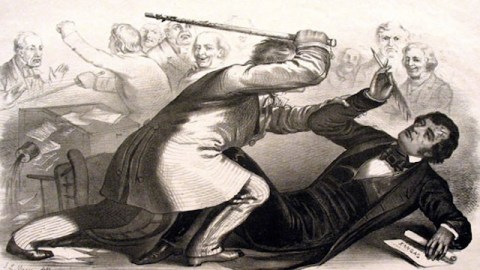More Studies That Show Democracy Isn’t What We Think It Is

However you feel about the right way out of the U.S. government’s struggles over its debt ceiling, I think we can all agree that the week past has not been a good advertisement for representative democracy. What it has been, though, is a fine illustration of the gap between real human behavior and Enlightenment notions of rational self-government—in both the personal and political senses of the term.
The U.S. government, like that of most rich nations, is founded on the assumptions that, as H.L. Mencken put it, “the common people know what they want, and deserve to get it good and hard.” People are supposedly aware of their unwavering wants, needs and principles, and use these to make political choices that advance their interests, according to logical reasoning processes that they can repeat and explain if anyone asks. Modern behavioral research has shown that these assumptions aren’t correct. Earlier this month, for example, this study on voting behavior provided yet another example.
As Christopher J. Bryan, Gregory M. Walton, Todd Rogers, and Carol S. Dweck point out write in their paper, published in the Proceedings of the National Academy of Sciences, just bothering to vote is already, strictly speaking, irrational: you’re more likely to be killed in a car accident than you are to influence an election with your one measly little vote.
Therefore the motivation to vote has other drivers than rational self-interest. Which means that it can go up and down for reasons that have nothing to do with “the issues” or the qualifications of candidates or a voter’s personal wants. That’s the point of the experiments that Bryan and his colleagues described in the paper (I’ve linked to the abstract above, but the full pdf is here.) In the first, before the summer, 2008 California primary, they gave eligible but unregistered voters a short survey. It came in two subtly different versions. One described the chance to vote using nouns that invoke identity (“How important is it to you to be a voter in the upcoming election?”) while the other used verbs to ask the same question (“How important is it to you to vote in the upcoming election?”).
As a group, potential voters who were asked about being a voter were significantly more interested in registering than were those who had been asked about voting. Because Californians can vote by mail, the researchers were then able to show that this effect has real-world consequences. They gave the survey to registered voters who had not yet sent in their ballots. Some 95 percent of people asked about being a voter sent in their ballots; but the rate for those who’d been asked about voting was just above 80 percent. They got similar results when they repeated the experiment for the 2009 gubernatorial election in New Jersey (included to make sure the effect wasn’t confined to wacky Californians).
Bryan et al. argue that people are more drawn to being a voter because that lets them participate in a positive social identity, and people are always motivated to see themselves as belonging to such groups. (It would follow then that people should be more averse to the prospect of being a cokehead than they would be to snorting cocaine, but I don’t know if this inverse idea has been tested.)
Interestingly, last year another team of researchers, using a different theoretical framework, also influenced people’s motivation to vote using a slight change in wording. In this paper, Kenji Noguchi, Ian M. Handley, and Dolores Albarracín had their volunteers complete 20 word fragments to produce words that, in some cases, involved action (“go,” “move”) while others involve inactivity (“relax,” “stop”). Asked later about their political behavior, those whose words involved action were more likely to say they would vote in the upcoming Presidential election (they were also more inclined to try to get others to vote and to volunteer to work in a campaign).
Just two more studies adding to the mountain of evidence that democracy doesn’t work the way we think it does. Now that the country is on the edge of a default almost no one actually wants, can we all finally admit that this isn’t a purely academic observation?
The noun-versus-verb study:
Bryan, C., Walton, G., Rogers, T., & Dweck, C. (2011). Motivating voter turnout by invoking the self Proceedings of the National Academy of Sciences DOI: 10.1073/pnas.1103343108
The “action words” study:
Noguchi, K., Handley, I., & Albarracin, D. (2010). Participating in Politics Resembles Physical Activity: General Action Patterns in International Archives, United States Archives, and Experiments Psychological Science, 22 (2), 235-242 DOI: 10.1177/0956797610393746





